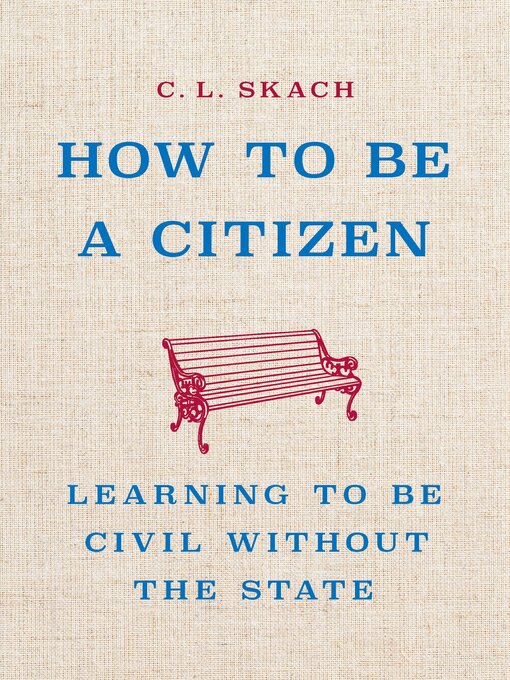In 2009, constitutional scholar C. L. Skach went to Iraq to help revise the constitution. She survived a missile barrage in the Green Zone—an event that proved a breaking point in her thinking about constitutions. In short: they don’t really work.
In How to Be a Citizen, Skach calls to move beyond constitutions. She argues that just as complex natural systems spontaneously generate order, we can, too. Looking to pandemic gardens, Reggio-Emilia schools, and community-driven safety patrols, she envisions not government by force, but society that is local, cultivated, and true. Grounded in six principles as simple as a call to spend time on a park bench, this book shows how community spaces, education, and markets can be reshaped to nurture cooperation and encourage flourishing.
Equal parts personal, philosophical, and practical, How to Be a Citizen invites us to see society not as something imposed by law, but rather something we create together.
-
Creators
-
Publisher
-
Release date
July 2, 2024 -
Formats
-
Kindle Book
-
OverDrive Read
- ISBN: 9781541605541
-
EPUB ebook
- ISBN: 9781541605541
- File size: 3864 KB
-
-
Languages
- English
-
Reviews
-
Kirkus
May 15, 2024
A constitutional scholar offers insights into why she believes that laws have become untenable "substitutes for our own judgement and collective action." The law has long been considered the backbone of a "healthy, stable [social] order," but Skach argues its rigidity has also been detrimental to the development of a fully engaged citizenry. As she writes, order in the modern world must come from "spontaneous, self-enforcing cooperation," which "calls for multiple leaps of faith and trust." At the same time, this implies that citizens are less subjects of law and more community members that enjoy "rights but also [owe] obedience to [themselves] and other humans" as they respect the rights of the planet and all living things. To work toward that end, Skach makes suggestions to help people become better citizens in the absence of a governing state and its laws. One approach is to become more open to decentralized social processes and movements and cultivate skepticism of centralized leadership hierarchies. Another is to embrace the idea of congregating with others in physical spaces that are neither fully public nor private to help foster trust--the kind of gatherings that have been lost in the virtual age of social media--and "provide the basis for social interaction at the macro level." Growing and sharing food is also essential to the ethic of empathy the author believes is crucial to creating citizens who can both work and live together in a democratic, cooperative fashion. Utopian as her ideas seem, the book's premise--that "it is with human nature...that we must begin and do the hard work"--is an important one to remember in divisive times, when the law has become meaningless at best or equated with violence at worst. Necessary reading for those who wish to foster civil discourse and societal cooperation.COPYRIGHT(2024) Kirkus Reviews, ALL RIGHTS RESERVED.
-
Formats
- Kindle Book
- OverDrive Read
- EPUB ebook
subjects
Languages
- English
Loading
Why is availability limited?
×Availability can change throughout the month based on the library's budget. You can still place a hold on the title, and your hold will be automatically filled as soon as the title is available again.
The Kindle Book format for this title is not supported on:
×Read-along ebook
×The OverDrive Read format of this ebook has professional narration that plays while you read in your browser. Learn more here.

